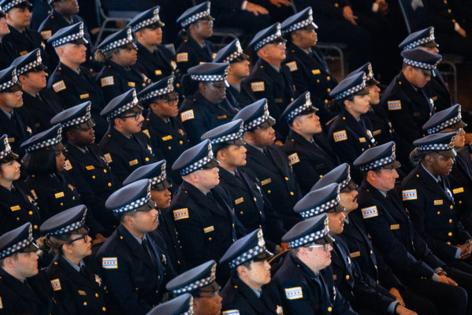Illinois Gov. JB Pritzker signs police and fire pension bill expected to cost Chicago billions
Published in News & Features
CHICAGO — Gov. JB Pritzker signed into law on Friday a measure that will provide some Chicago police officers and firefighters with higher pensions, an adjustment that will eventually cost the city’s taxpayers billions of dollars.
The new law aims to bring parity between Chicago and downstate first responders and help bridge a shortfall in benefits for employees hired after 2010. Chicago police officers and firefighters argued they deserved the same benefits as downstate first responders.
“The legislation codifies adjustments the city of Chicago has been implementing over the years to tackle pension system challenges and represents a proactive step to prevent more significant financial or legal issues in the future,” Pritzker spokesperson Alex Gough said in a statement. “The Governor remains committed to maintaining fiscal responsibility at all levels of government and expects the city of Chicago to implement these changes with careful planning and fiscal discipline.”
The Civic Federation, a budget watchdog group, raised alarm over the long-term costs of the measure days after it sailed through the General Assembly without opposition at the end of May. The group warned it would add billions to the city’s pension liability, which topped $35.9 billion at the end of 2024.
The city’s financial office said an actuarial analysis of the bill found the change “would increase the city’s pension liabilities by more than $11 billion across the Police and Fire funds,” while dropping the funding levels of both down to less than 18%. Those funds had only 25% of the money necessary to pay out future retirees at the end of 2024, but were slowly improving.
The measure, sponsored by Democratic state Sen. Robert Martwick of Chicago, would add an extra $60 million to the $1.5 billion pension tab in 2027, the city’s analysis found, and the additional outlay would grow to more than $753 million for 2055.
It would represent a major setback to the city’s efforts to right its pension ship. The retirement funds for city workers are among the worst-funded in the country.
“In recognition that this particular amendment passed with a veto-proof majority, we will continue to work with the Illinois General Assembly, and our City Council members to find long-term solutions that stabilize the city’s pension funds with dedicated, progressive revenue so that Chicago’s workers can know that their retirements are secured,” Chicago Mayor Brandon Johnson’s office said late Friday.
In July, Chicago Chief Financial Officer Jill Jaworski called the bill an unfunded mandate foisted on the city by state lawmakers. The bill does not offer a permanent solution to Tier II compliance and will likely require a later fix, she said, because it ties benefits to inflation instead of the Social Security wage base.
The bill also left a Tier II fix for the city’s other two pension funds unfinished — the city’s Municipal and Laborer’s pension funds “face more near-term risks of falling out of Safe Harbor compliance,” she said.
This issue comes under the backdrop of the failure of both city and state officials in the spring to come up with a broader fix for a projected shortfall in what are known as Tier II retirement benefits, which are granted to public employees hired after 2010 as a result of a measure passed by state lawmakers in an effort to help ease massive pension debt.
Despite concerns that benefits for the employees at some point won’t be equal to what Social Security would provide — a violation of a federal “safe harbor” law — the legislature did not pass a comprehensive Tier II overhaul this session. However, the budget passed by lawmakers includes a $75 million set-aside to help pay for the first year of expected adjustments for state Tier II employees.
The Chicago pension measure signed by Pritzker provides three key benefit boosts to a large group of Chicago’s first responders.
It increases the final salary cap used to determine pension benefits for police and fire retirees from $127,283 to $141,408. It also changes the rate at which that salary cap for police officers and firefighters rises every year. Currently, it’s either half of the rate of inflation or 3%, whichever is lower. The bill switches that calculation to the full rate of inflation or 3%, whichever is lower.
The third tweak changes the time frame to determine that final average salary figure. Right now, police officers’ benefits are based on the average of the highest salary from eight of the last 10 years of their career. The bill allows for an alternate calculation based on four of the last five years, a boon for officers who received big raises at the very end of their careers. Officers would be paid the higher of the two.
Firefighters were already granted that “dual-method” calculation in 2023, and downstate police and fire pensioners won it as part of the consolidation effort.
____
©2025 Chicago Tribune. Visit at chicagotribune.com. Distributed by Tribune Content Agency, LLC.







Comments